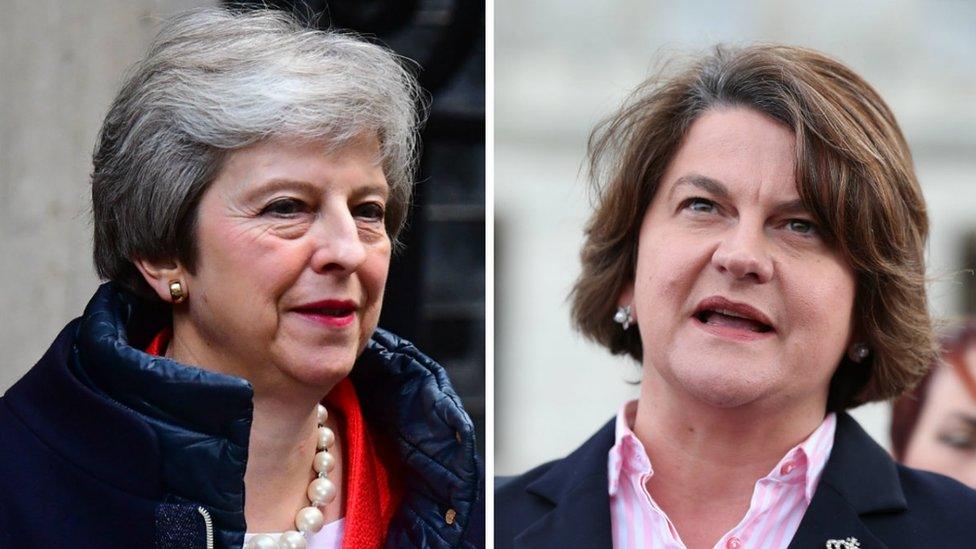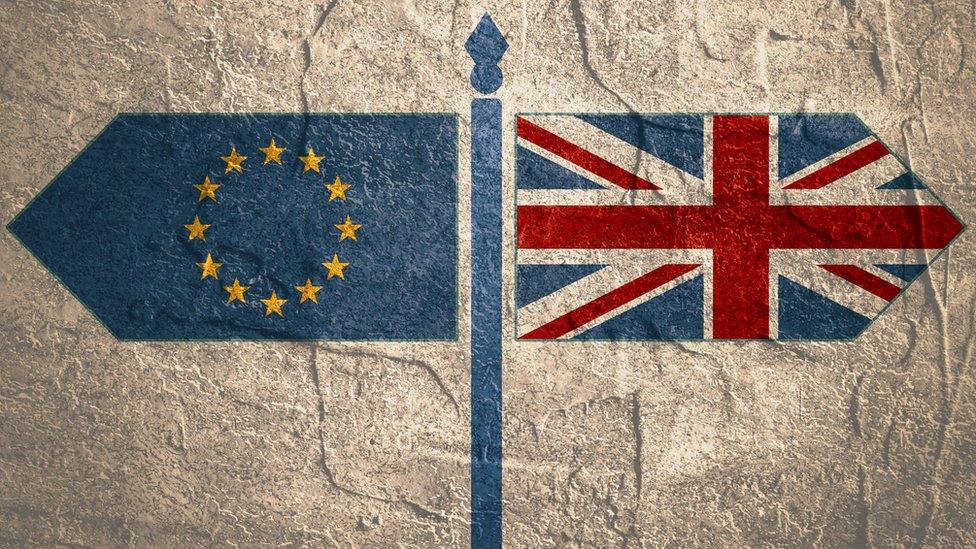Brexit: Did Theresa May fail to understand the DUP?
- Published

Theresa May has failed to achieve the most important goal she set herself after delaying the vote on her Brexit deal last month.
Assurances from Brussels on the Northern Ireland backstop, laid out in a letter today,, external do not go far enough to allay the concerns of the Democratic Unionist Party.
Her failure on this front means that, far from being reassured, the DUP is now unsettled.
Nigel Dodds, the party leader at Westminster, says: "Rather than reassure us, the Tusk and Juncker letter bolsters our concerns."
The DUP response represents a blow to the prime minister, who pledged to win back the Unionists after winning the vote of confidence in her leadership last month.
Downing St regards the DUP as "dominos"; with the Unionists on board, Tory Brexiteers would fall into line, her deal would stand a good chance of passing and the prime minister would have a viable way of governing up until the next scheduled election in 2022.
The EU's declaration that it will not renegotiate the Withdrawal Agreement, nor offer clarifications that undermine it, came as little surprise to the DUP.
The Unionists had been told by a senior figure in No 10 that the prime minister had not formally tabled their demands on the backstop - the insurance policy against a hard border which would tie Northern Ireland into the EU's orbit if the UK and the EU fail to negotiate a future relationship by the end of the transition period.
The DUP wanted one of three demands on the backstop: scrap it, secure an end date or secure a unilateral exit mechanism.
In her letter to the EU the prime minister floated the last two of these demands but made clear she had not formally tabled them.
Nigel Dodds said: "Despite a letter of supposed reassurance from the European Union, there are no 'legally binding assurances' as the prime minister talked about in December. In fact, there is nothing new. Nothing has changed."
The DUP was always highly unlikely to support the Northern Ireland backstop for one very simple reason.
It would mean that Northern Ireland would be treated differently to the rest of the UK, placing it in the EU customs union and largely within the single market.
Assurances from No 10 that there would be one single UK customs territory cut no ice with the DUP.
Any hope that the DUP might be persuaded to support the deal was killed off when the legal advice by the attorney general, Geoffrey Cox, was published last month.
The following sentence was the coup de grace: "The implications of NI remaining in the EU single market for goods, while GB is not, is that for regulatory purposes GB is essentially treated as a third country by NI for goods passing from GB into NI."
In his first objection to today's exchange of letters, Nigel Dodds says that "everything the attorney general said in his legal advice regarding the backstop, still stands".
So the question is how the prime minister misread a party - with the word Unionist in its title - by assuming that they could support a deal which would treat their part of the Union differently to the rest of the Union.
It appears the prime minister may have made one or more of three miscalculations:
Misreading internal DUP relations. The prime minister has a good relationship with the DUP leader Arlene Foster, leading some in government to believe she is more reasonable than other DUP figures. While the DUP may not speak with one voice, the party does largely have one view on the backstop.
Misunderstanding the DUP's history. Some in No 10 may have assumed that the DUP would behave in the manner of the once mighty UUP, a former sister party of the Conservatives which had a history of siding with the Tories. But the DUP will draw stumps if they think the Union is in jeopardy.
Money. Many ministers have suggested the DUP can be bought - dangle a few extra billions and they will fall into line. But the history of the DUP shows that where the Union is concerned the DUP cannot be bought.
Theresa May regards herself as a Unionist who, for all her setbacks, may be remembered as the prime minster who saved the Union after the SNP lost so many seats in the 2017 general election. But No 10 may well have misread the DUP, with major consequences for this prime minister.
You can watch Newsnight on BBC 2 weekdays 22:30 or on iPlayer. Subscribe to the programme on YouTube, external or follow them on Twitter, external.
- Published25 November 2018

- Published12 January 2019

- Published7 January 2019